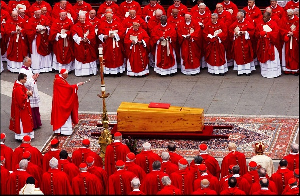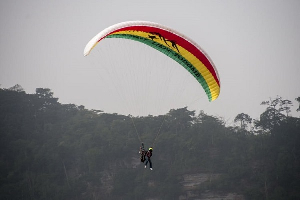The 2nd part of this article looks at the perils of the recent oil discovery in the Cape Three points area of Ghana. The 1st part dealt with the promise of the discovery.
Economists often talk of the "curse of oil" pointing out that countries with resources such as oil often grow more slowly, more corruptly, less equitably, are prone to more violence, and with more authoritarian governments to boot. The authors of "Escaping the Resources Curse" - Jeffrey Sachs, Joseph Stiglitz, and Macartan Humphreys - assert that there is "a strong association between resource wealth and the likelihood of weak democratic development, corruption and civil war".
The question has been asked several times, "will Ghana's oil be a curse or a blessing?". In other words can we in Ghana get it right where so many in Africa have gotten it wrong? Of course Ghana is no Nigeria, but if the history and development of oil producing countries in Africa are anything to go by, then we may not escape the oil curse. Oil is not always a boon. What if Ghana's oil fuels corruption rather than development, and creates the same combustible mix of great wealth, extreme poverty, grievances and instability as it has in other African countries?
Taking the example of three African oil producing countries of Angola, Nigeria and Gabon, I will analyze the effects of oil production on its people, both it's promise and it's perils and draw lessons for Ghana. The end of Angola's long running civil war in 2002 enabled its oil industry to take off in full swing with its first explosive gush of production and inflow of cash. Angolan GDP is expected to grow by 27% this year (2007) while oil production is expected to grow about 25% per year. Today Angola is awash with cash but controlled by a few political elites and oil oligarchs. A number of resort island beaches have been developed, where yachts, power boats and jet skis are always on daily display. Since 2002 businessmen have been flying into Luanda offering huge sums of money in return to access to oil. China has offered over $5 billion in interest free loans to Angola.
Oil Revenues in Angola in 2005 amounted to over S10 billion and that number is expected to soar until production peaks in 2011. This is the first gusher of wealth in a country that has never known it but the gains are not being evenly distributed nor being invested in productive ventures. The Capital, Luanda, has huge shopping malls where silver plated ash trays sell for as much as $7000. Yet 70% of Angolans still live below the poverty line. Cholera and malaria are abundant and child mortality rates are among the worst in the world.
Angola is following a path that's painfully familiar among African oil producing countries from Equatorial Guinea to Sudan. The pattern is: well connected businessmen and unscrupulous government officials grow impossibly rich and the ruling class uses its wealth and largesse to consolidate its own power. Much of this money is diverted into foreign bank accounts and assets abroad while the overwhelming majority of the population stagnates or even grows poorer. As in other parts of Africa, oil no doubt continues to dominate the economy. It currently accounts for around 90% of all exports in Angola, compared with 77% in Gabon, and 95% in Nigeria. The second stage of the oil curse kicks in at this point. Investment in other industries gets crowded out in part because it's hard for them to provide high enough returns to meet the cost of rising rents and salaries. Oil becomes virtually the only game in town and the benefits for workers is surprisingly limited with many of the more lucrative jobs going to foreign experts.
In some cases unemployment can actually worsen. Fueled by the new spending power of the few, the cost of living also goes up. If the government doesn't share the wealth, the higher prices mean real poverty actually rises and in Angola there's little evidence to suggest the government is sharing the oil cake. A 2004 Human Rights Watch report claimed that $4.25 billion in oil revenues went missing between 1997 and 2002.
In Nigeria, it is much worse. Nigeria is the oil giant of Africa. It is also one big problem. Nigeria pumped its first barrel of oil in the 1950's and has since set records for corruption. The government's own anti corruption watchdog, the Economic and Financial Crimes Commission estimates that between independence in 1960 and 1999, the country's rulers have stolen $400 billion in oil revenues --- equal to all the foreign aid to post colonial Africa during the same period. And while a small elite became filthy rich, its members fought one another for the spoils. In 47 years, Nigeria has suffered a civil war that killed one million people, 30 years of military rule and six coups. Meanwhile two thirds of the country's 135 million people remain in poverty, a third are illiterate and 40% have no safe drinking water and no electricity. Then there is the environmental cost. More than 1.5 million tons of oil have been spilled over 50 years, and the Niger delta is one of the most polluted places on planet earth. Not surprising, disenchantment with the country's political leaders run deep.
In Gabon, the country is so heavily dependent on oil that everything is imported from France. At a supermarket in downtown Libreville, a box of eggs from France cost $15, a small bunch of carrots for $10 , a bottle of French wine (Chateau Ausone 1999) cost $350. Libreville has consistently rank among the top 10 most expensive cities in the world for the past 20 years. .A country that ranks 124th on the Human Development Index but where Hummer and BMW dealership thrives. Beyond these privileged circles, overwhelming majority of Gabonese are extremely poor. Reports from Libreville says the poor scavenge on refuse dumps that the huge supermarkets that serve the privileged few dump expired products. According to the World Bank, "It's really two worlds in Gabon, the rich and the poor, there is nothing in the middle". The opposition leader in Gabon Mr Pierre Manboundou says his party, the Gabonese People's Union figures about 15,000 people in Gabon hold about 80% of the country's wealth.
No country can ever develop without a vibrant and expanded middle class. Oil in Africa almost always makes a few people impossibly rich and drives millions into extreme poverty. It eliminates the middle class and kills entrepreneurial spirit.. This is an extremely sad situation because oil money is supposed to do the opposite - expand opportunities for many and be the engine of growth for the middle class upon whose back the country's economic development can take off.
What can Ghana learn from the failures of Angola, Nigeria and Gabon just to mention a few? Many lessons indeed but are we going to learn? Already the fight is on before the deposits are really confirmed. The government and the opposition are engaged in a silly fight over who discovered oil and who discovered salt. How silly, nonsensical, and childish. When the oil finally starts flowing can the government look the good people of Ghana in the eye and promise them that Ghana " won't do a Nigeria"? To ensure that, Ghana needs to construct a watertight system of oversight, checks and balances , transparency to instill probity and accountability in the management of the oil revenue. This system of accountability will ensure that oil revenue is taken out of government hands and put under the control of an independent commission with Parliamentary oversight and wholly accountable and responsible to the good people of Ghana. We have to learn and apply the lessons of Africa. We need to use the oil money to diversify the economy, invest in the vital sectors of the economy including education, health, and infrastructure development and create opportunities for all. We have to invest in our people to break the poverty cycle that afflicts us in order to build a sustainable future for our children and our children's children.
Tokyo, Japan..
The writer is a political and social analyst and policy strategist based in Tokyo. He has written extensively on political, social , and economic issues on Ghana and Africa. He welcomes your comments .

Views expressed by the author(s) do not necessarily reflect those of GhanaHomePage.














